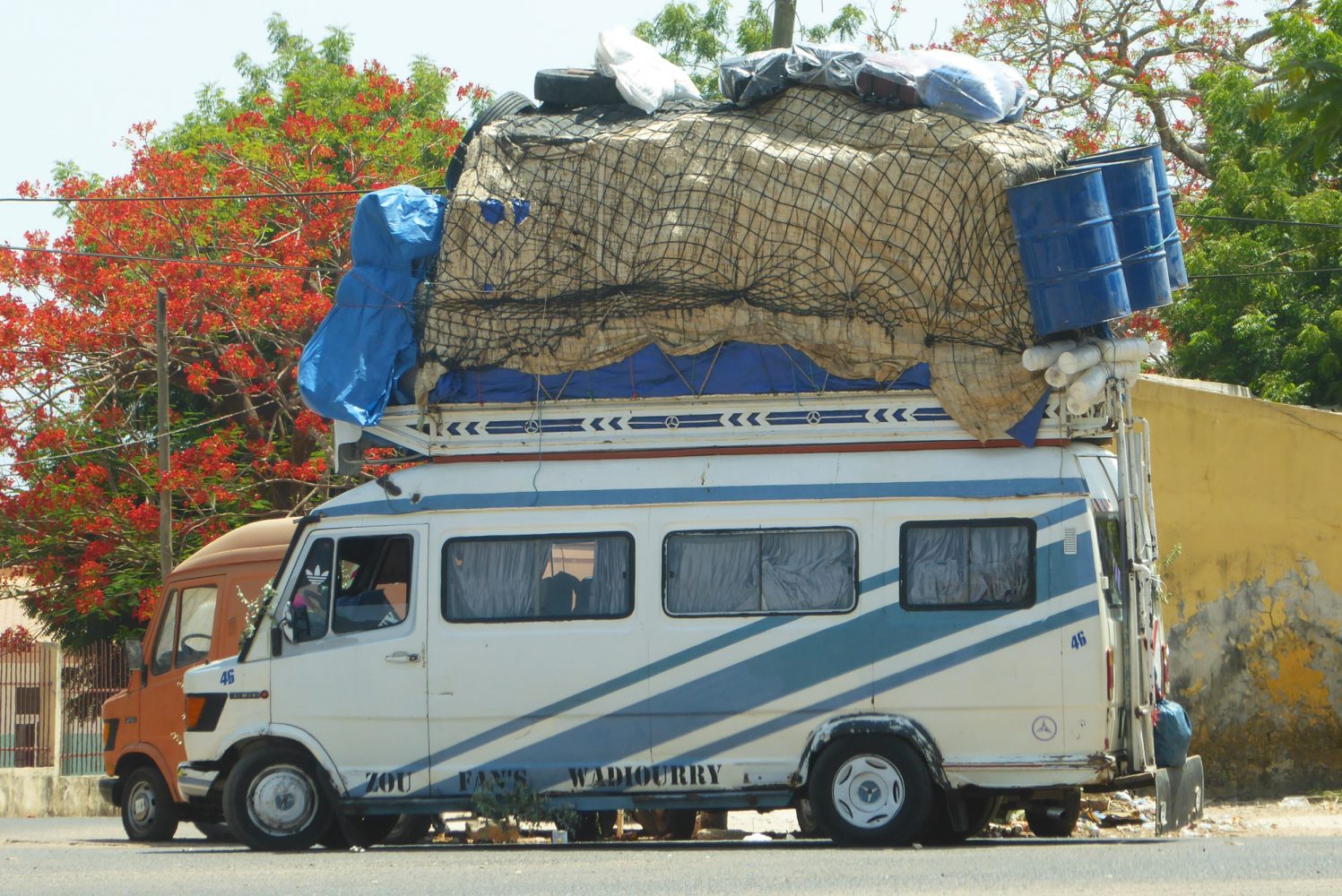From Senegal to Guinea Bissau
In a small clay hut, behind a crooked, much too low, and visibly worn-out plywood table, Guinea Bissau’s customs officer sits on his white plastic garden chair looking at the carnet. Obviously, he doesn’t know what to do with our vehicle’s customs document lying upside down in front of him. Tourists don’t come here often. Didi hesitantly points to the spaces to be filled in, helpfully explaining where data needs to be entered, and the official immediately places his rubber stamp on the appointed place. After we pay the mandatory road fee, they say goodbye with a hearty laugh, and we step out of the dark room with it’s pressed clay floor onto the bright, dusty street.
At passport control, we are impertinently asked for a gift. Shrugging our shoulders and grinning broadly, we decline. You can give it a try, both sides seem to think. Then the rope, stretched across the street at waist level indicating the border, is lowered, and we are cheerfully waved through.
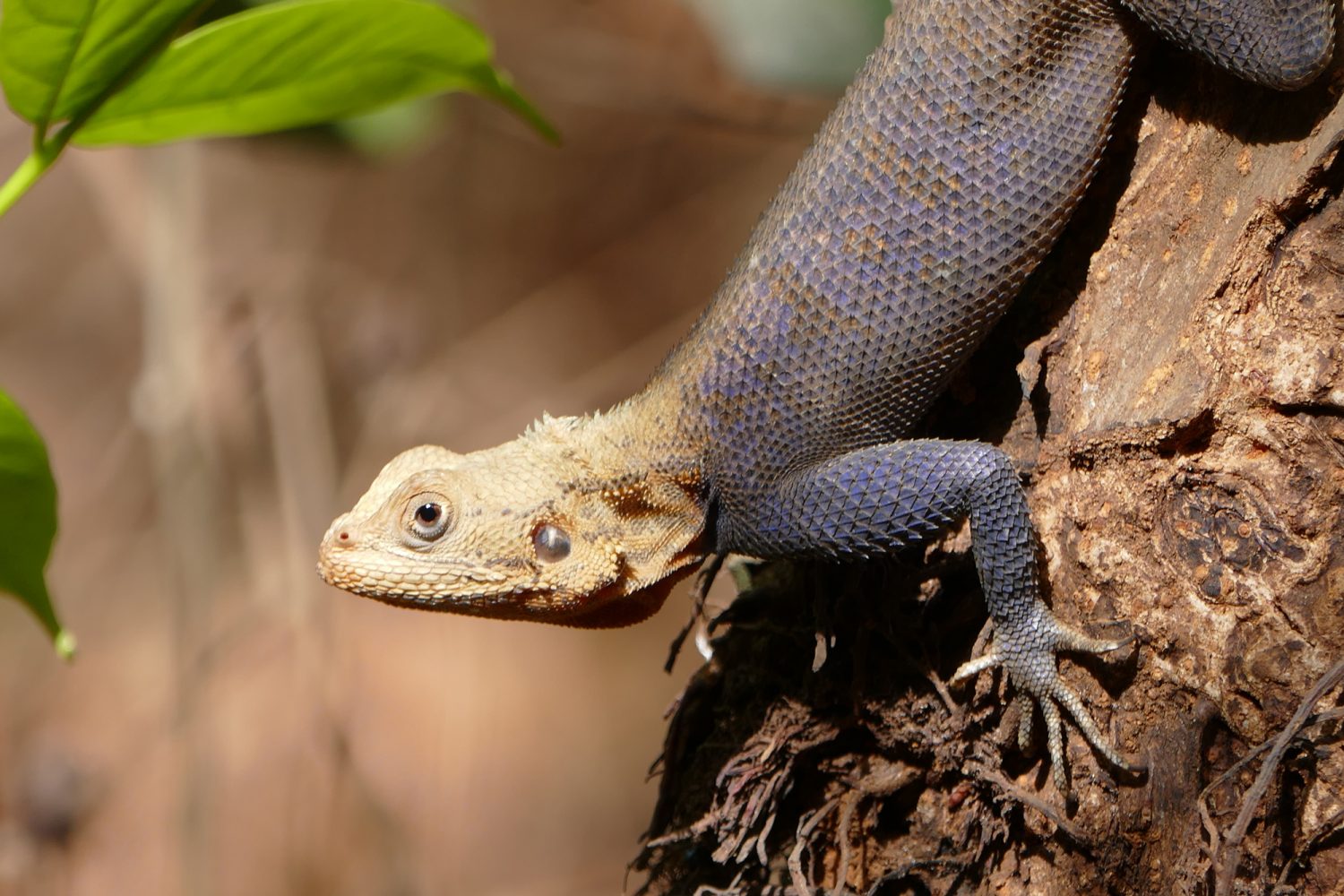
Guinea Bissau’s Police Controls
Less than 3 kilometers after the border, we come to the first police check for which Guinea Bissau is notorious. The country is one of the poorest in the world, and so the officials try to increase their small wages.
Immediately, police meticulously begin an inspection: the travel pass, the headlights, the brake lights, the horn—VanGo’s pneumatic horn makes a bored policewoman standing in front of our car give a jump.
Emergency flasher: working.
Warning triangle: available.
Second warning triangle: also available.
Fire extinguisher: available, but the expiry date has passed! Ahhhhh, that will cost you! No, because we have a second one and that one’s fine!
A 10,000 CFA fine is required!?!
“For what?” Didi asks.
“I don’t know, just a lump sum so you can continue driving.”
Didi smiles kindly but shakes his head no. The “you-may-continue-driving charge” rises to 28,000 CFA (approximately $45 USD) and fluctuates drastically in the course of the “negotiations.” It’s like bargaining at the bazaar in front of an audience.
Windshield washer fluid: working.
Taillight: working.
Everything’s working.
We don’t accept the fine because we haven’t made any mistakes. They continue discussing and debating, and some seem to be thoughtful. In the end, one of the civilian villagers takes the papers from the policeman’s hand very carefully, and with calming words, passes them over to us. We thank him and leave for the May 1 Festival in Varela.
May 1 Festival
After 50 kilometers on a potholed dirt road, we reach the small dead-end town of Varela on the west coast. A rope is stretched across the town entrance road, blocking our way, to be able to cope with the rush. To put it bluntly, there is chaos. The entire village, including the beach, is overcrowded, full of cars and tents. A deafening cacophony of music hits us from all directions. No, we don’t want to stay here because we can’t even think about sleep with this noise. And, after all, we’ve already undergone a border crossing point and several police checks. A quiet, restful night would not be a sin.
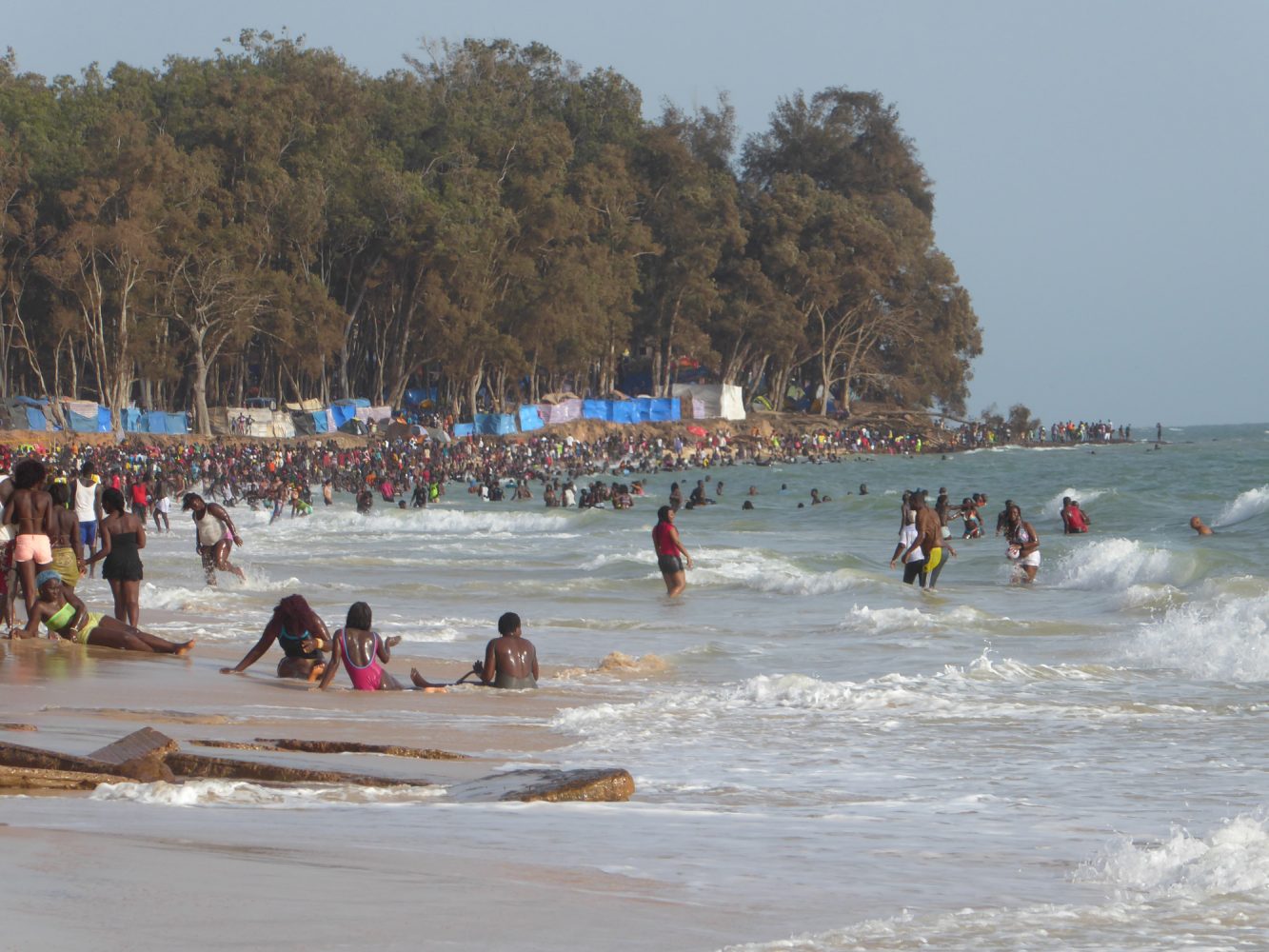
Fortunately, a local gives us advice to turn right just before the barrier and drive a few kilometers further north on the sandy track parallel to the beach. It will be quiet there, he says.
After 2 kilometers, a serious bush fire blocks our way. We take a wide berth around it, driving over burnt grass towards the sea to find a nice place right beside the Atlantic Ocean.

In the evening, we become curious to see the festival and decide to venture into the crowd. We cannot estimate yet how this group of young, drunk, partying people will behave towards us. So far, we only know the Bissau people’s mentality from the police checks and the country’s terrible reputation.
Guinea-Bissau is considered as one of the top four Narco countries in Africa. Some even say it is the only “real” Narco state in the world because even the highest-ranking officials are involved in cocaine smuggling. It is the turnstile for drugs between America and Eurasia. The United Nations estimates that at least one billion dollars’ worth of cocaine is transported to Europe via West Africa every year.
We are told that most drugs get from Guinea Bissau to Europe hidden in cashew sacks and end up in containers that are shipped back and forth through various ports until their path “gets lost.” We don’t know if it’s really that easy, nor do we care.
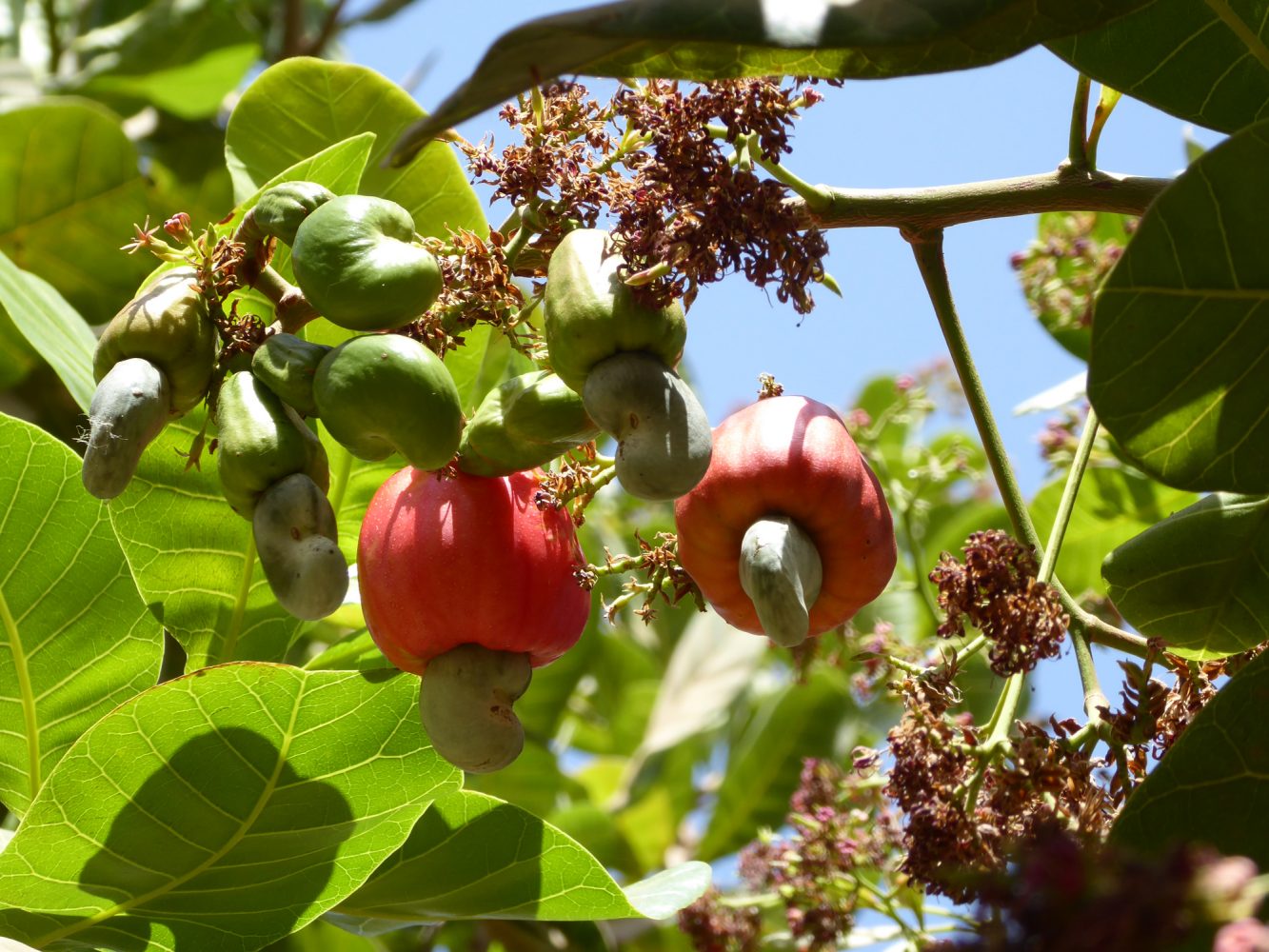
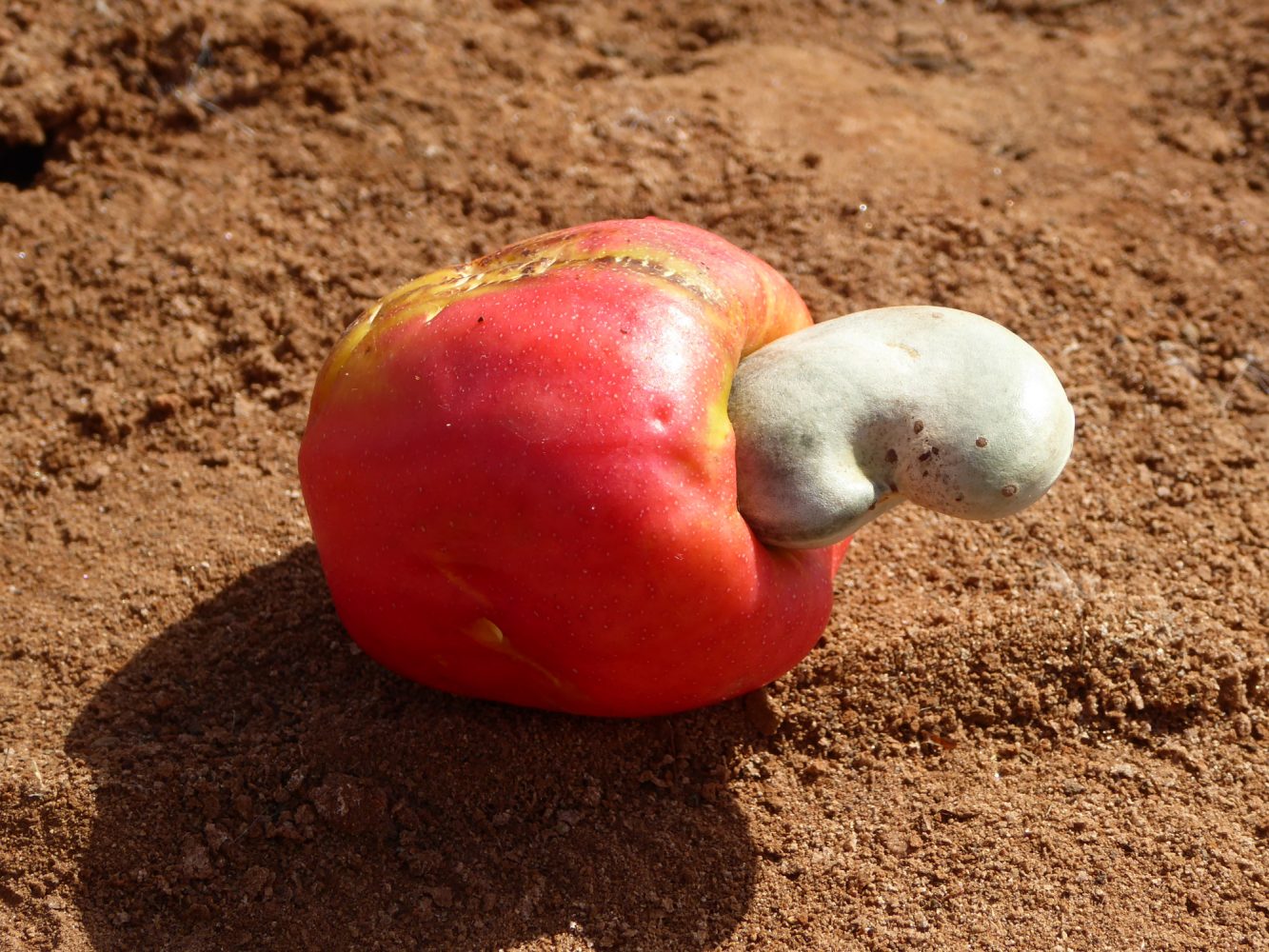
For me, it is much more important to mention that there are millions of cashew trees in Guinea Bissau. We are here at the right time (harvest time), but unfortunately, cannot buy any cashew nuts. They are either exported for roasting or consumed directly by the population. Only in the super-overpriced “supermarkets” (large rooms with shelves where you can find (if stocked) tuna cans, mayonnaise, ketchup, and the like), we sometimes see cashews—reimported cashews that are twice as expensive as in Germany.
By the way, the trees smell wonderful with a heavy fruity odor. The nuts taste delicious, and so does the schnapps made from them. And there is plenty of schnapps in Varela.
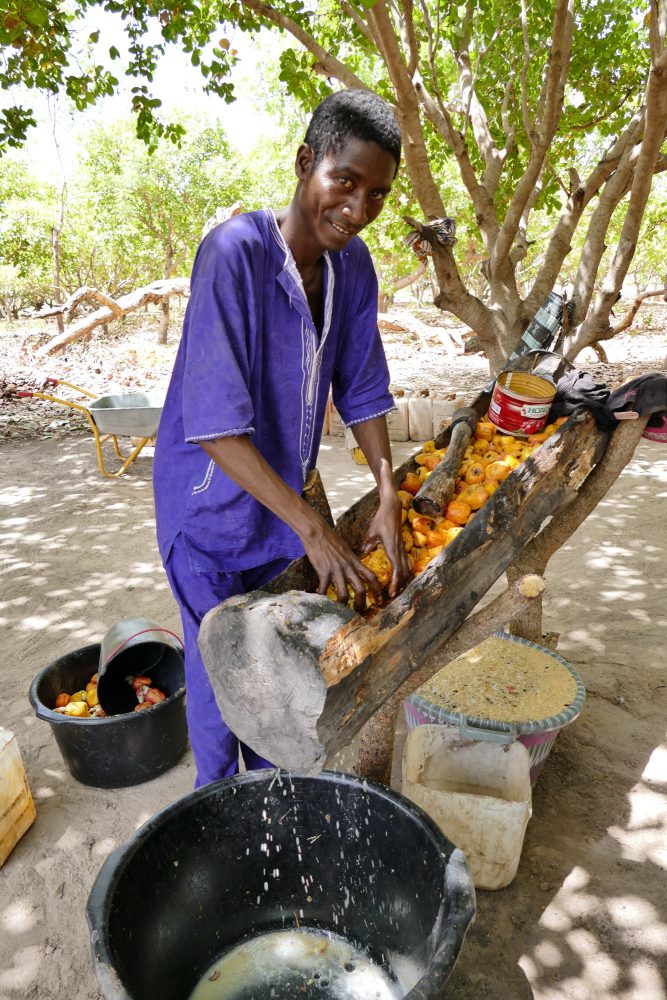
We walk towards the festival on the beach. Without exception, everybody is friendly to us, albeit with a certain reserve and on their best behavior. They talk to us at the same level and seem to be in an infectiously good mood. There is no aggression in the air: everybody is laughing, dancing, and having fun. Women are rather revealing in a way we have not seen in months. People like to take pictures, and some ladies even self-confidently ask whether they are allowed to be in a picture with a white man.
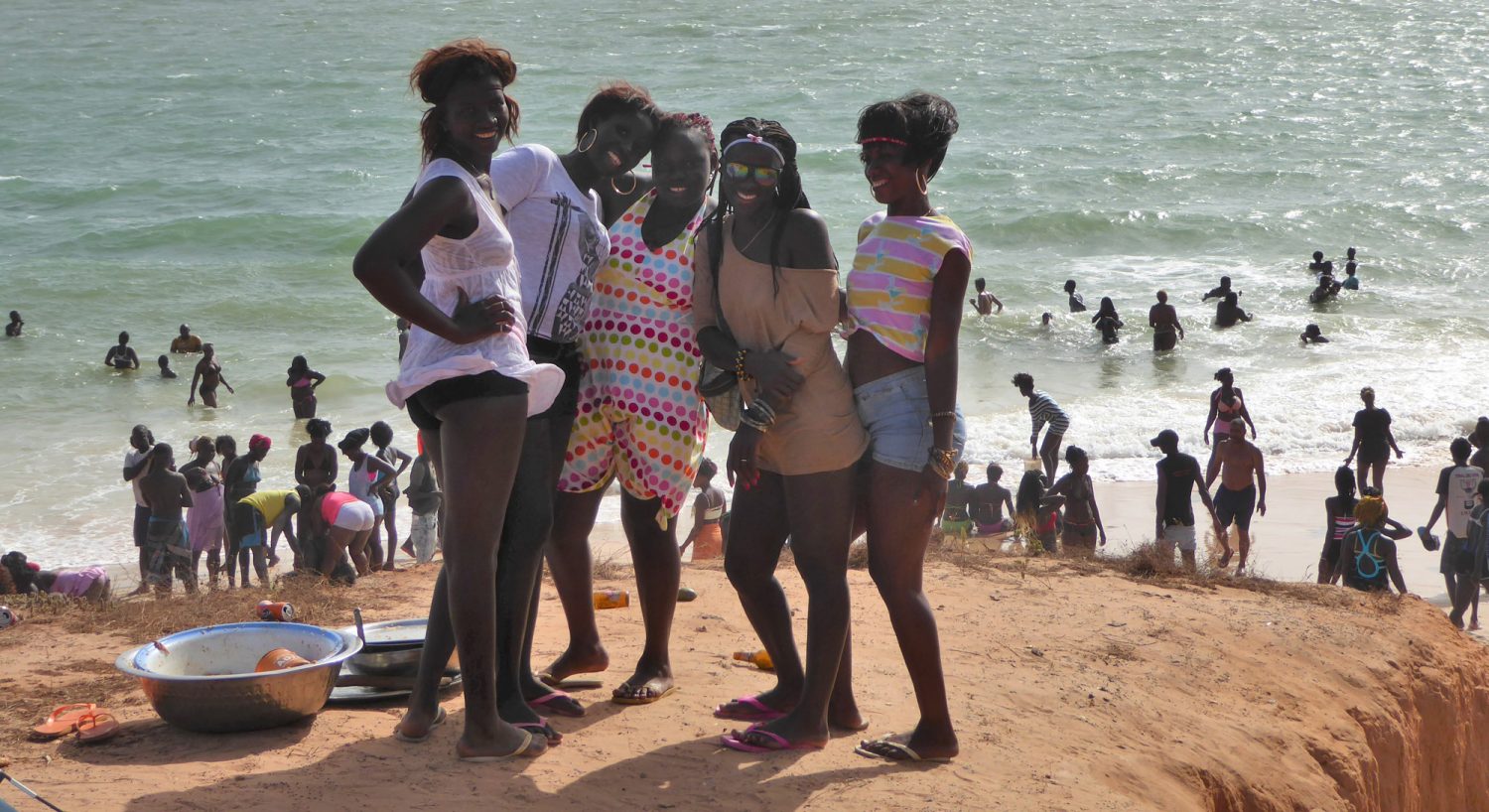
The visitors prepare their own meals and sell their delicacies to earn a little party money. Finally, there is tasty beer and good wine. We get to know people and find out that Guinea Bissau is a really special country. During the course of the weekend, we enter the fray several times, but at night we are very happy to retreat to our nice and quiet place.
On the Ferry to Bubaque
This ferry takes us in six hours to the main island of Bubaque and then back 10 days later without being sunk.
Heather and Eugene, an overlander couple we already met in Gambia, are joining us. We leave our cars with a German in Bissau and take a taxi to the harbor in the morning. After we take a closer look at the ferry for the first time, we send up a quick prayer.
There is no access control to the old port, which is becoming more and more impossible elsewhere in the world. We stroll along the slippery stinking pier past a capsized ship rusting at the mole and with the wobbly fishing boats, the cheap snack bars, and the girls behind the small charcoal grills, we feel transported back to former times.
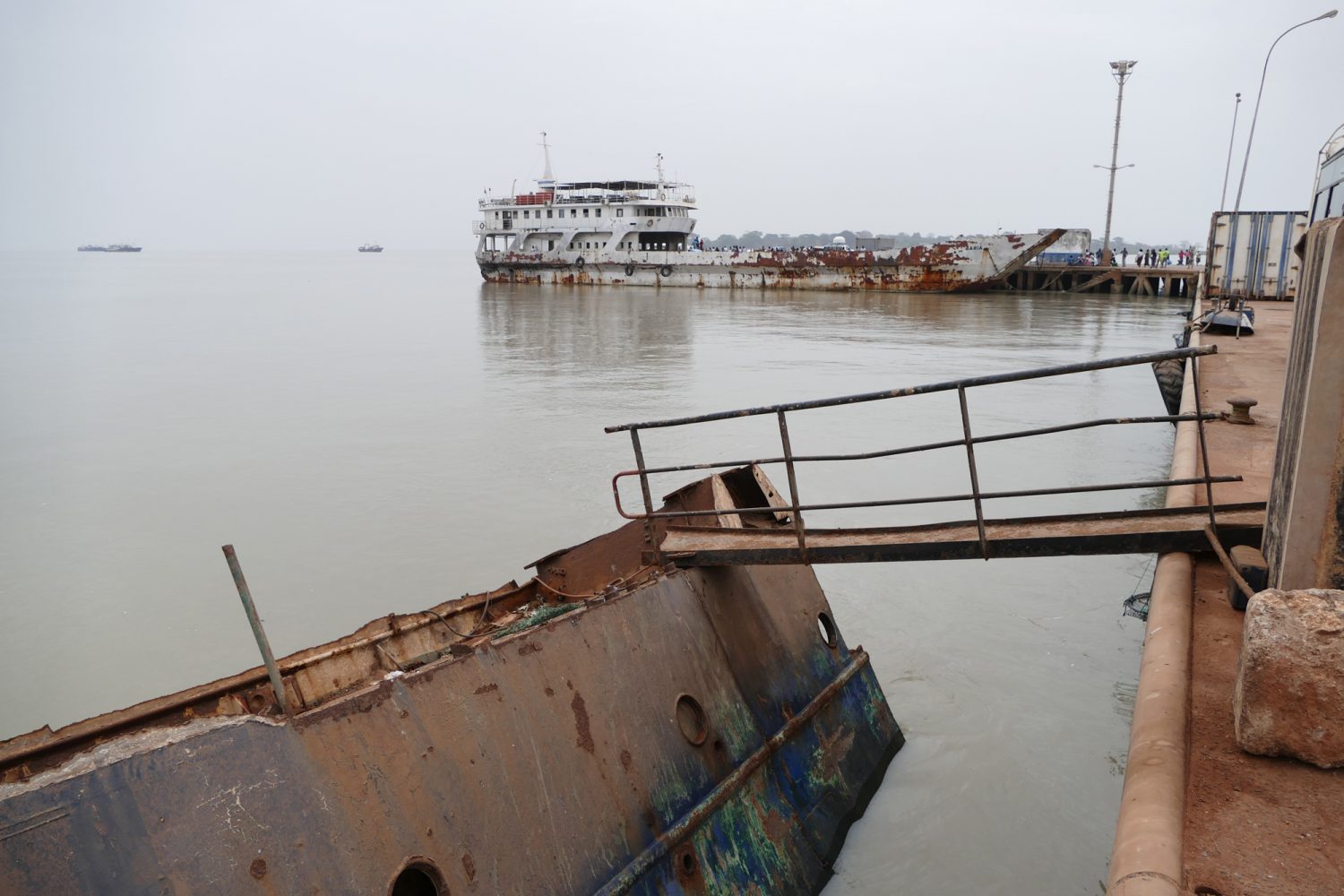
We watch the hustle and bustle while they are loading the ferry. Chickens, squealing pigs, fuel, building materials, cookware to prepare the fish that will be sold in sandwiches later—everything goes on the ferry. First, everything is loaded onto one side. The main thing is to take the shortest way over the rail, as everything in the usual African “order.” Why don’t they open the front hatch to load the goods? That will remain the captain’s secret forever.
By the way, did I mention that Africans are very relaxed when it comes to getting things done? Things that are not top priority on their list, with that they are extremely relaxed. But if it is important to the Africans, they will push, such as in the shop at the cash register. And right now, they all want to get onto the ferry at the same time or rather be the first with their belongings. It’s a terrible mess.
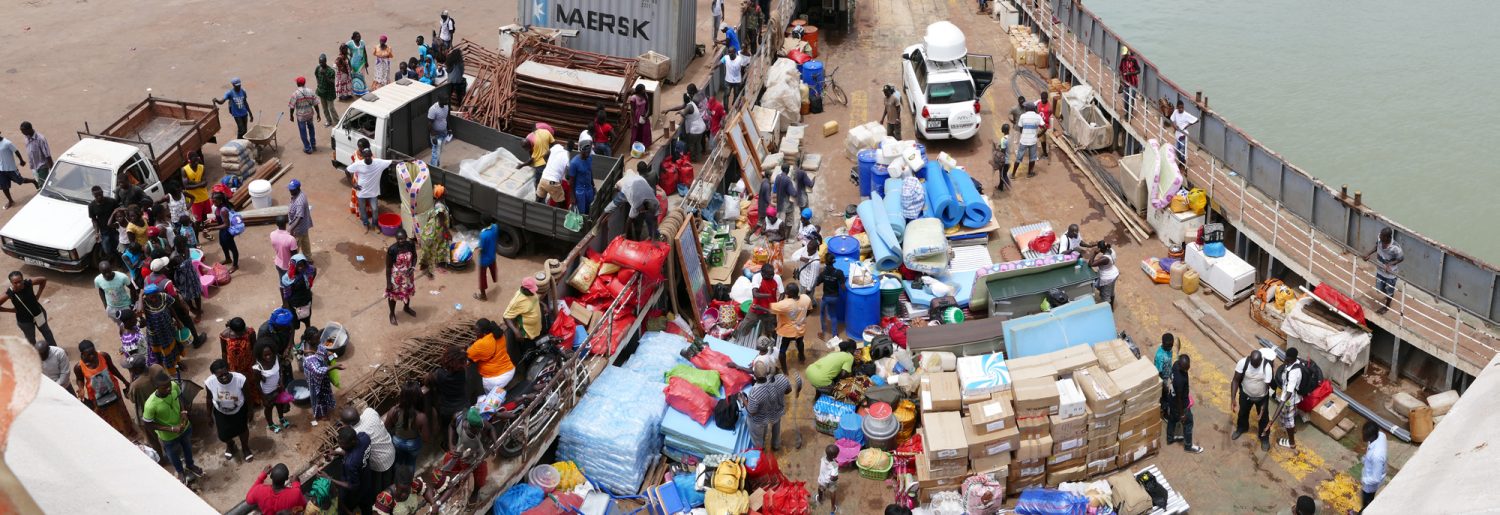
During the journey, they are still reloading so that the ferry is well balanced in the water. We leave with a delay of only 20 minutes. The tides don’t wait. What is special about this ferry are the undefined departure times. They depend on the tides and can be requested at the ferry port the day before departure.
We book the middle class with wooden benches. Yes, there are, in fact, three classes on this ferry: third, the lower deck where the “goods” (pigs, cars, etc.) are transported, where people are cooking food and drinking palm wine; second, comprised of wooden benches outside under awnings; and first, consisting of padded seats in the air-conditioned closed deck—but the air conditioning does not work, and it is stuffy and hot.
The landing is even more interesting than the departure from the port. The Google Earth vehicle, the only car on the ferry, has to get off somehow. At the jetty this is not possible, since the car can hardly drive up the stairs. So, the ferry quickly docks at the stony beach.
The ferry drives to the shore at a certain angle, and the ramp is lowered. Due to the strong current, the ferry is slowly drifting off in a semicircle around the lowered ramp. Now the car has to come ashore quickly before the ramp lifts off the uneven stony ground or is already halfway in the water.
Originally, we had thought of taking our cars to the island, and first, seeing the enormous size of the ferry did not understand why only one car could be possible. The time to get off is already pretty tight for just one vehicle. The fact that many people also choose this quick way ashore does not make things easier for the Google Earth vehicle, and the off-road unloading of a car is just barely made.
After “docking,” some necessary maintenance work is carried out on the dry dock. Hopefully, it will be finished by the time we go back.
The dock is not really a dry dock. The ferry just goes ashore at high tide. The low tide does the rest, and the ship is stranded. A European shipbuilder’s or safety officer’s heart will certainly sink into his boots watching this.
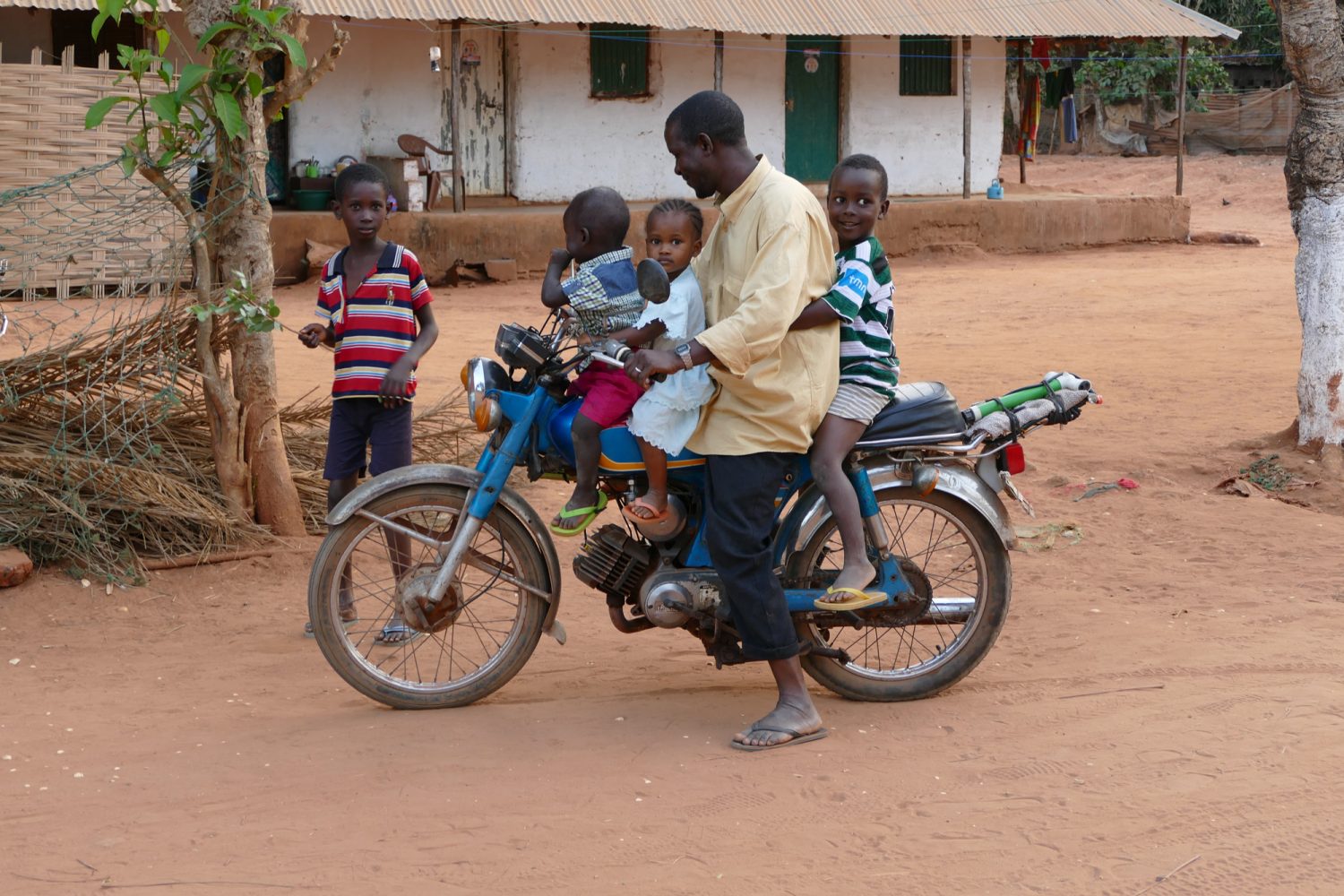
For those interested, the ferry leaves Bissau every Friday (if there is enough fuel and the technology works), stays in Bubaque until Sunday, and then goes back. You can choose whether you want to stay on the islands for just a day, for a little more than a week, or even longer. There is also the possibility to take a speedboat to the islands at a total price of 300,000 CFA (about $420 USD, divided through the number of passengers, max. 10 people). Then you can leave at any time.
We paid 5,000 CFA (about $7 USD) per person for our second-class crossing.
Approximately 80 islands form this archipelago that was part of a delta until 2,000 years ago. There are so many sandbars here that the ferry can only go at specific times. Most of the islands are uninhabited, and the inhabited areas are very difficult to reach or only by private boats at horrendous prices. Therefore we did not see the sea hippos (no, this is not a joke or a typo; they really exist here).
Between Rubane and Bubaque there is a small motorboat running regularly to bring guests to the lodge there. That sounds good, and so we make a visit to the lodge. It is off-season, we are the only guests, and the hotel manager tries to tempt us with a special price.
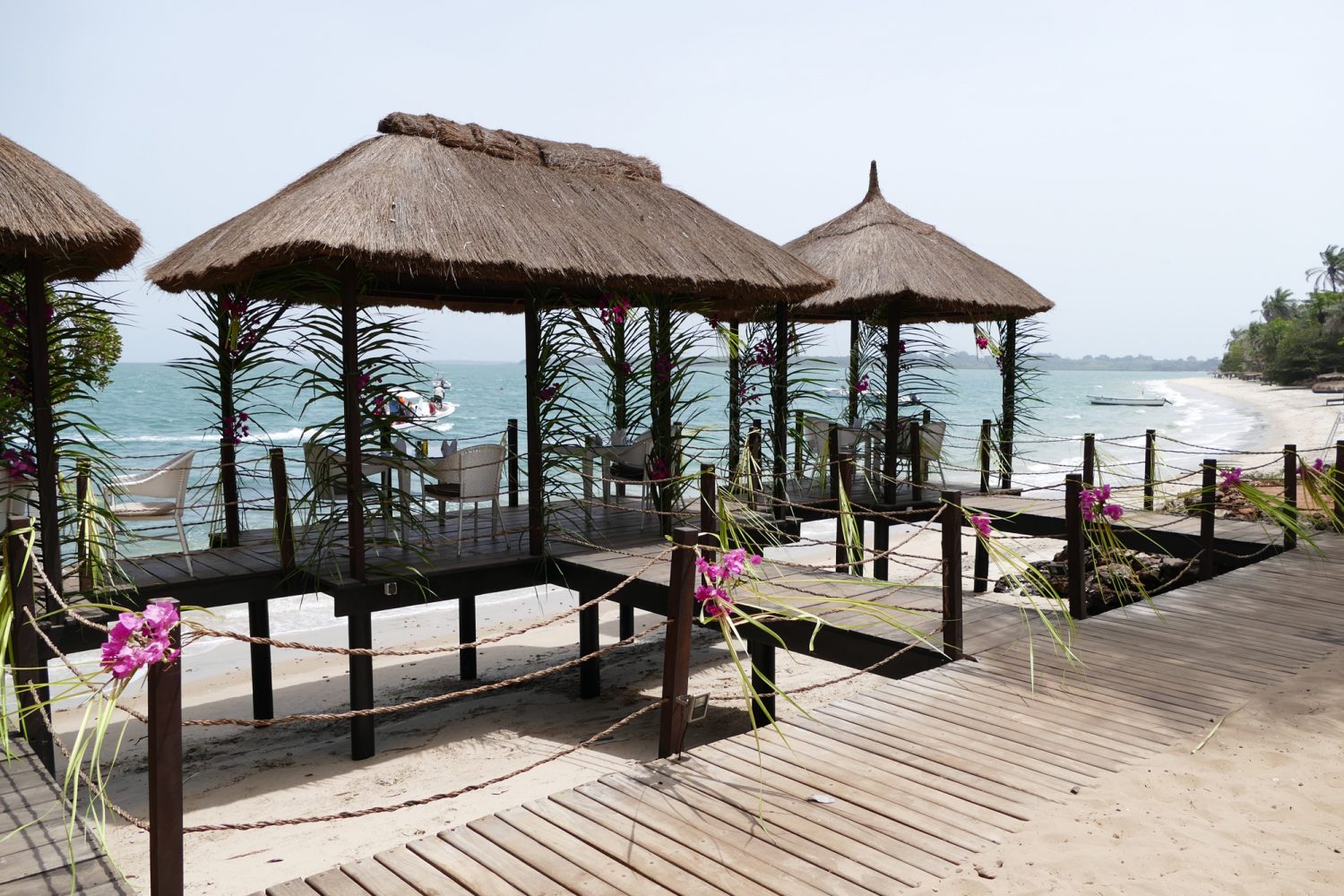
Didi and I are actually not the type of people go for something like this, but after months of deprivation—outside toilets and showers, food that was more like survival than pleasure, and nightly so-called mobile discos blubbering until sunrise, Didi immediately says, “We’ll do that.”
Back on the main island, we meet Eugene and Heather in Melchior’s restaurant. The owner is a Spaniard who loves fishing, and so does Eugene. The archipelago is a paradise for fishermen. They quickly agree to go fishing on an uninhabited island. Organizing a suitable boat is a matter of negotiation and is left to Melchior. The engine is negotiated separately, as well as the estimated fuel consumption. Everything has to be paid in advance.
The next day Melchior and Eugene arrange to meet at 10 a.m. We are there. The boat is not. Around noon we hear the not-so-healthy sound of an outboard chugging round the corner. Already on this short distance, somebody is bailing out the pirogue. The engine is not what had been agreed upon. It should have 15 horsepower, and this one has only 8 horsepower. Didi says that he would not even go to the island opposite with this boat, as the current in the archipelago is strong.
But Eugene and Melchior absolutely want to go. There is also an additional passenger, a local woman, who wants to be dropped off on the opposite island of Rubane. A free taxi boat is always happily taken advantage of. At 10 a.m., the tide would have been on our deep-sea fishermen side. Now they have to motor against the current, and to us, it looks like they are moving not even one meter until we lose track of them. Eugene later says that they moved in circles because the current was too strong, and the underpowered boat couldn’t cope with it. In addition, the engine packed up, and there were no tools at all on board. Luckily, Eugene was able to repair the engine with his diving knife while the boat was drifting on the sea. That could have turned out really bad. Fortunately, the weather didn’t change.
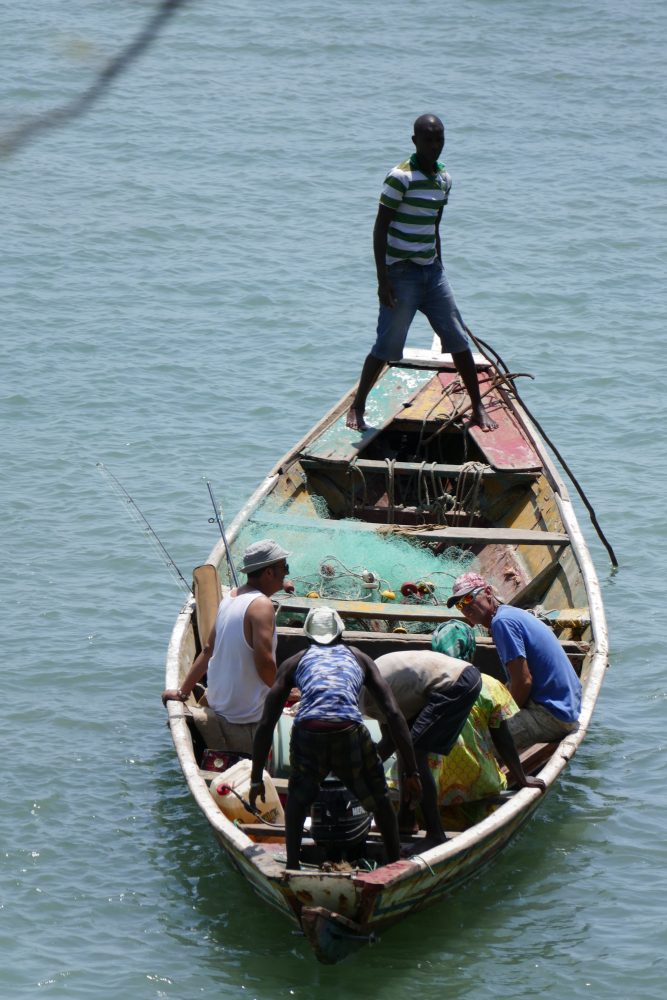
Then, on the islands, the captain’s job is to keep an eye on the boat at night. You remember: bale out the boat because otherwise, it will sink. But in the evening, this fellow gets plastered on palm wine, prefers to sleep, and leaves the boat near the beach. The next morning at low tide, they find the boat about 20 meters away from the sea. The boat is made of solid wood and is much too heavy to pull back into the water.
The captain killed three birds with one stone: he slept well, he doesn’t have to drive the two anglers hither and thither on the sea (so he can still relax a bit on the island until high tide is coming back). With this, he saves a lot of fuel (thanks to the smaller engine anyway), which Melchior paid for in advance, and which he will for sure keep and not pay back. Good deal.
It’s just too bad that the Spaniard is losing his temper, and he gets back into the boat in a rather bad mood.
Looking back, and for us as bystanders (Heather cannot stop laughing), it’s an extremely amusing story the two sunburnt anglers are telling us while we all have a glass of wine and the freshly caught fish.

Melchior also tells us about the special “liberalness in interpersonal living together” of the islanders. Matriarchy is prevailing here. There is no female circumcision, very unusual for a West African country. Perhaps it is also due to this fact that people are so open-minded. Nowhere else in Africa do women show such self-confidence as in Guinea Bissau. Melchior gives an example: “If you sit here in my restaurant and want to go with a man, that’s okay. If you want to go with a woman, that’s okay too. And if you want to go with a pig, that’s also okay. Nobody gets upset; nobody says a word about it. Everything is just normal here.”
In the guidebook, I read that the woman chooses the man. For this purpose, she places a bowl with rice in front of his hut. If the bowl is empty the next day, he agrees to the invitation for the test night. It rarely happens that the guy declines the courtship. But if it happens twice, he has to emigrate to find a wife. Women are in no way obliged to marital fidelity, and a husband would never dare to reproach his wife. He is neither entitled nor in the position to get a divorce. Only if the wife kicks him out can he marry again.
In the carnival, the second largest in the world after Brazil, you can only take photos if you have special authorization. Guess why? According to our Spaniard, the local girls are jumping up and down through the streets of Bissau wearing nothing but a very short raffia skirt.
There is a 15-kilometer road on Bubaque Island, the only one in the archipelago. That is why there is a means of motorized transport only on this one island.
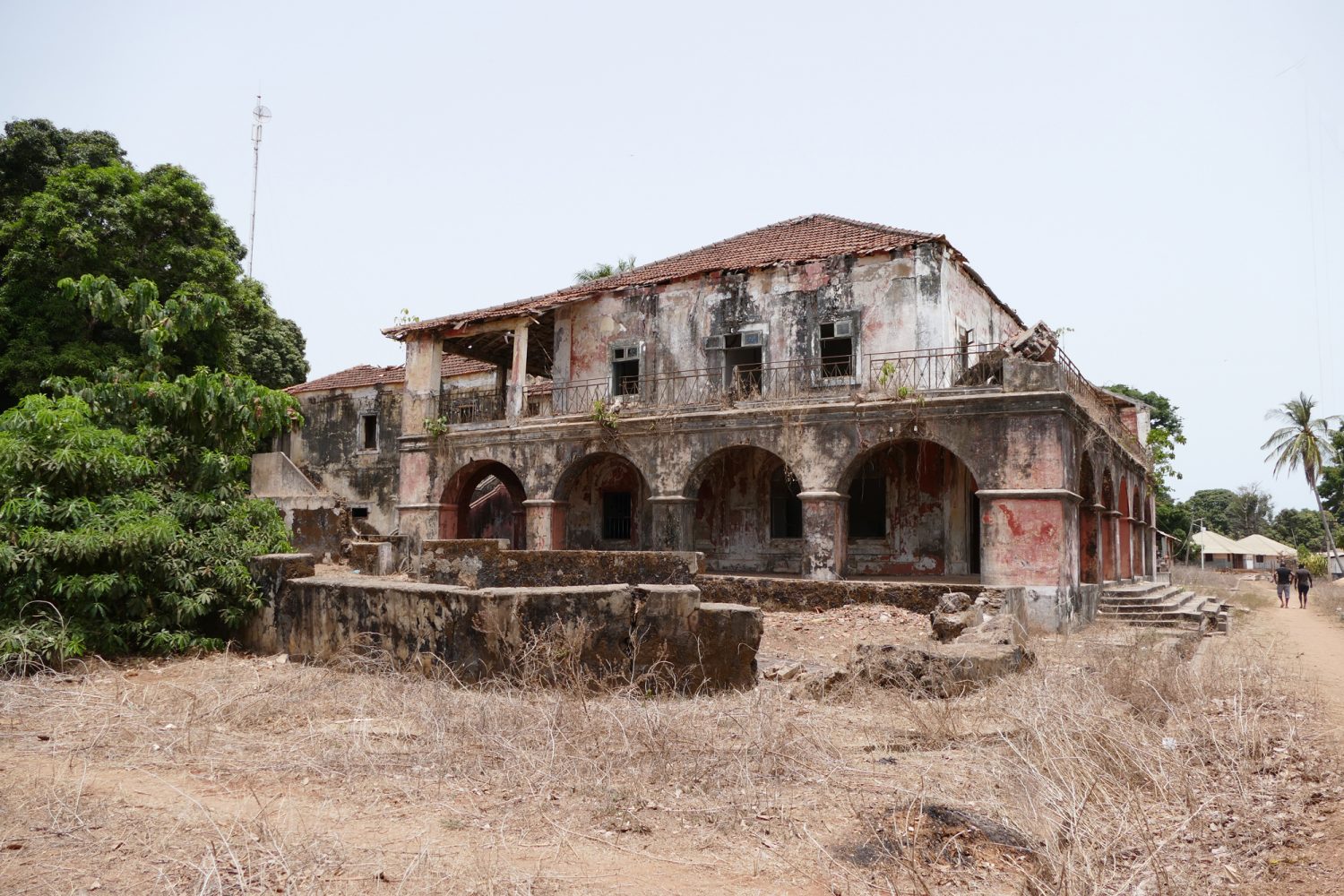
With Heather and Eugene, Anna and Tim (who we met last weekend on the island), Giovanna (a doctor who has treated eye diseases here for three months), and many locals, we organize a beach party. The dancing is a feast for the eyes and extremely contagious. We share the tuk-tuk with three blacks originally from Guinea Bissau, who now live in France. Oh yes, here it’s no problem to talk about the “blacks.” The locals call us “brancos” (white people). They keep calling this out to us on the way to the beach. In the tuk-tuk, a woman with great braided hair says, “Preto.” And what does that mean? “Black man.” We give it a try immediately, and it ends in a rhythmic singsong: “Branco,” “Preto,” “Branco.” Everyone is laughing and having a lot of fun.
The next day, the newly painted ferry brings us back to the mainland. “Newly painted” means what you can get done during low tide.
Jemberem: Three Chickens and Some Sleepy Chimpanzees
It is still 91 kilometers to our destination, the village of Jemberem in the middle of the jungle. The road surface is quite alright. Already at the next junction, the road conditions are drastically changing. This muddy path is still marked as the main road on the map, but we already know it will get worse.
VanGo’s roof pushes away the branches above us. It’s scratching and creaking over the solar panels. We estimate that at a height of more than 2.80 meters, you would often need to get out of the car and saw off branches. A wider vehicle would not get through without major tree felling. We have to fold the wing mirrors several times, and stories are engraved in VanGo’s car finish like wrinkles in an old face.
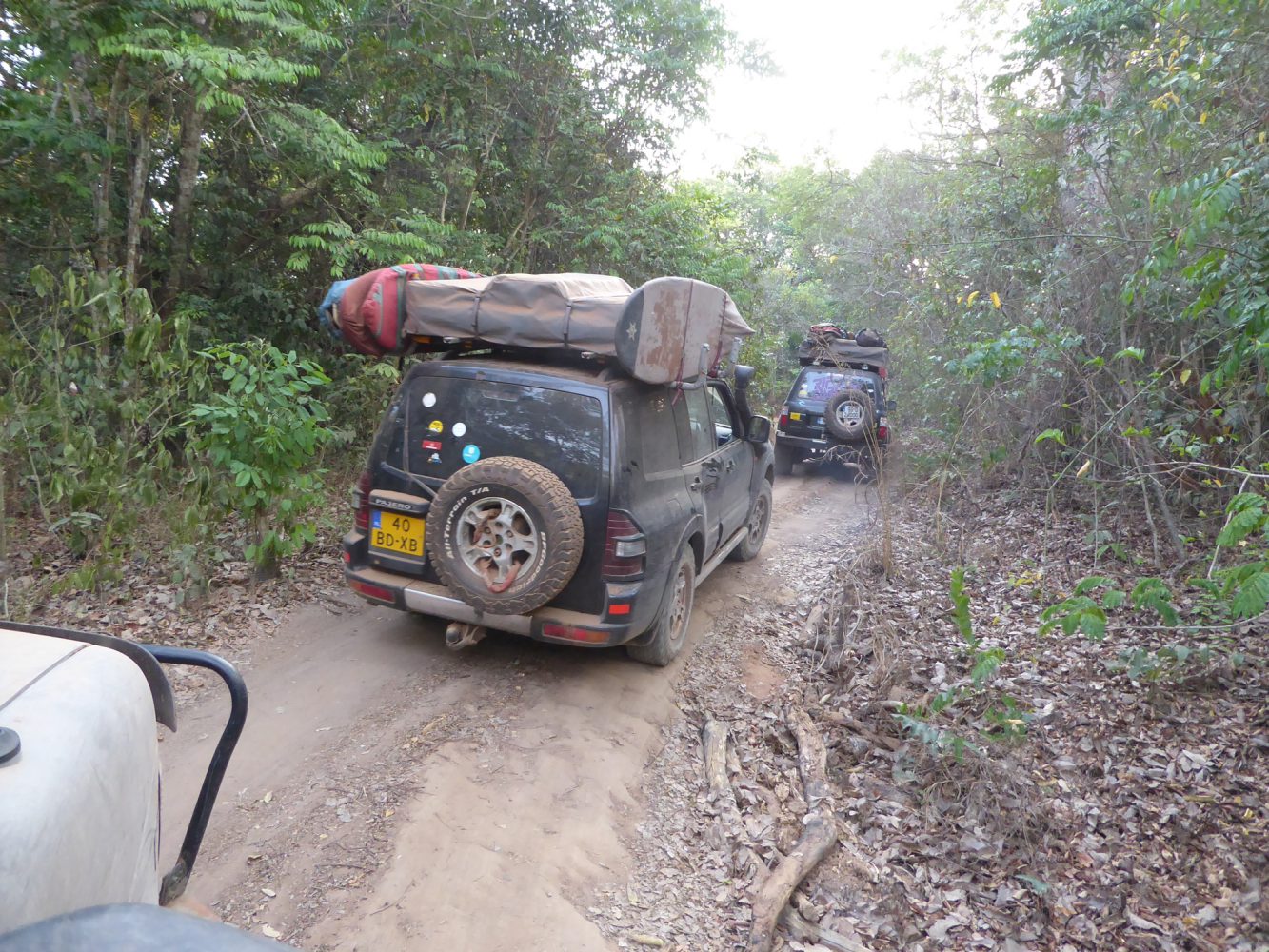
Tim’s surfboards attached to the side of his Pajero show signs of fighting, and the trees and bushes win this fight: some boards are damaged.
According to our navigation system, we have another 52 kilometers to go; the road widens again when we leave the thicket of the jungle.
However, wider does not mean better because soon we encounter deep ditches and faults that test the flexibility of the chassis suspension.
It’s no problem for Eugene’s Land Cruiser J8 and our Ford E350 van, both with still two rigid axles each. But Tim’s Pajero has to pass several times and lifts one wheel spectacularly into the air just like a dog lifts a leg. As a result, the traction breaks off, and in places where the vehicle is at an angle, it could easily slide to the side because the lateral guidance of the wheel is suddenly missing.
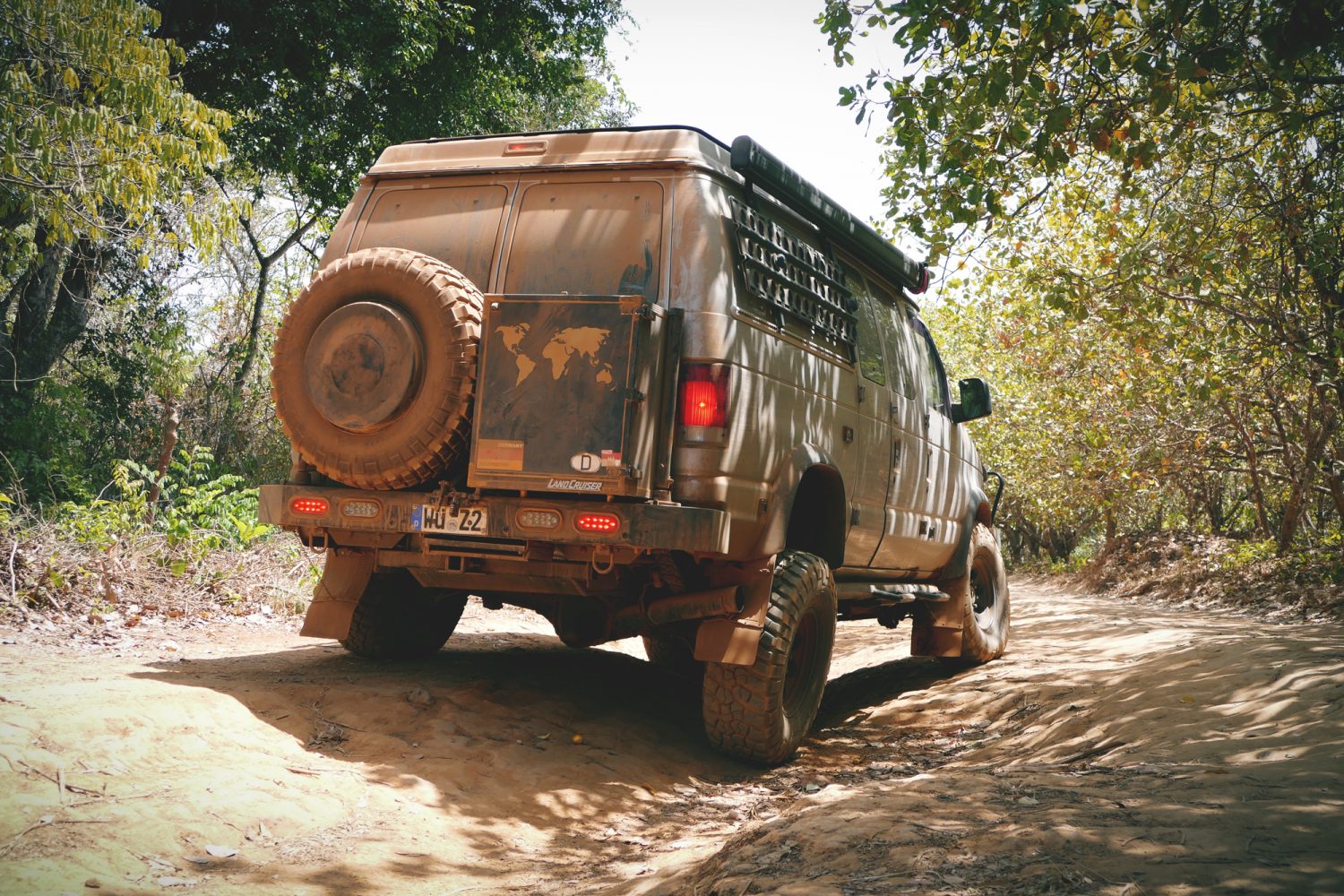
Later, Tim and Anna tell us that they thought we (especially Eugene and Didi) had gone crazy during the ride and cursed us. If they had been by themselves, they would have turned back after a few kilometers. Having reached the destination, they are quite rightly happy and proud of themselves and their car.
According to the calendar, the rainy season has already started, and Didi secretly hopes for some water falling from “above.” Then the dirt road is supposed to be impassable. So that would be a good test for our long journey around the African continent. As there are three of us, we could all help each other if necessary.
Apart from Eugene, nobody shares Didi’s hope, and the rest of us are happy that it will stay dry for the next few days.
By the way, this is a 90-kilometer dead end, so we have to hop back the entire way.
In Jemberem, we would like to see chimpanzees. They say that this will not be possible tomorrow but only the day after tomorrow. Somebody has to be looking for the chimpanzees first, and it is simply too late today. But we could go on a three-hour guided walk through the jungle the next day.
We learn a lot from our expert guide. Small termites build huge structures. If a finished hill has holes, you know that they left. Termites no longer live there, but maybe snakes do. So be careful.
There is a special fruit (we don’t remember the name) the locals use as a colorant for the skin. Short exposure time creates a bluish-brown tan. If you leave the inside of the fruit on the skin for longer, you get a brownish-black color. As far as we understand, the locals like to color the places of the foot where the back and the sole of the foot merge. They can then conceal the lighter part.
Unnoticed, two ants crawl up my leg under my long pants and bite. I pull my pants down as quick as I can because bites of the stitching ants burn like hell. Some natives use the biting tools of the army ants to stitch smaller wounds together when necessary. For this, they place the ants on the appropriate part of the body until they bite and then turn the bodies off so that only the “clips” remain in the human skin.
If you want to see chimpanzees, you have to get up early. Already at 5:00 a.m., we cycle 10 kilometers on a country lane through the jungle. It is pitch dark. Fortunately, each of us has a headlight because bicycle lights are not standard here. Brakes and gears are working. Who would have expected that? Potholes that appear too suddenly in the light cone and not driving too close behind the dust-raising bike in front are real challenges. Just before the place where the chimpanzees are supposed to be, we have to get off our bikes, push them, and keep quiet.
We arrive just in time at the break of dawn. Some distance away, there are palm trees with flattened crowns. No trace of chimpanzees. We don’t even know where to look. But then something is moving in the treetop. A chimpanzee is stretching—first his arms, then his legs. He lies down again. He turns, sits up, yawns, lies down again, stretches again, and sits down again. He looks around and then takes a closer look. Now he sees us. We are very quiet and stand still.
They wake up almost like humans. Even the sounds they make are not unlike the noises of some people.
By the way, every chimpanzee has its own nest, separate bedrooms if you will. Every evening, they build a new one in a different tree. When they have had enough of stretching and lounging around, they climb down from their bed and disappear into the jungle thicket out of sight. Now we know why we had to get up so early.
Eugene’s bike has a flat tire. But the jungle provides everything you need to live—even repair kits.
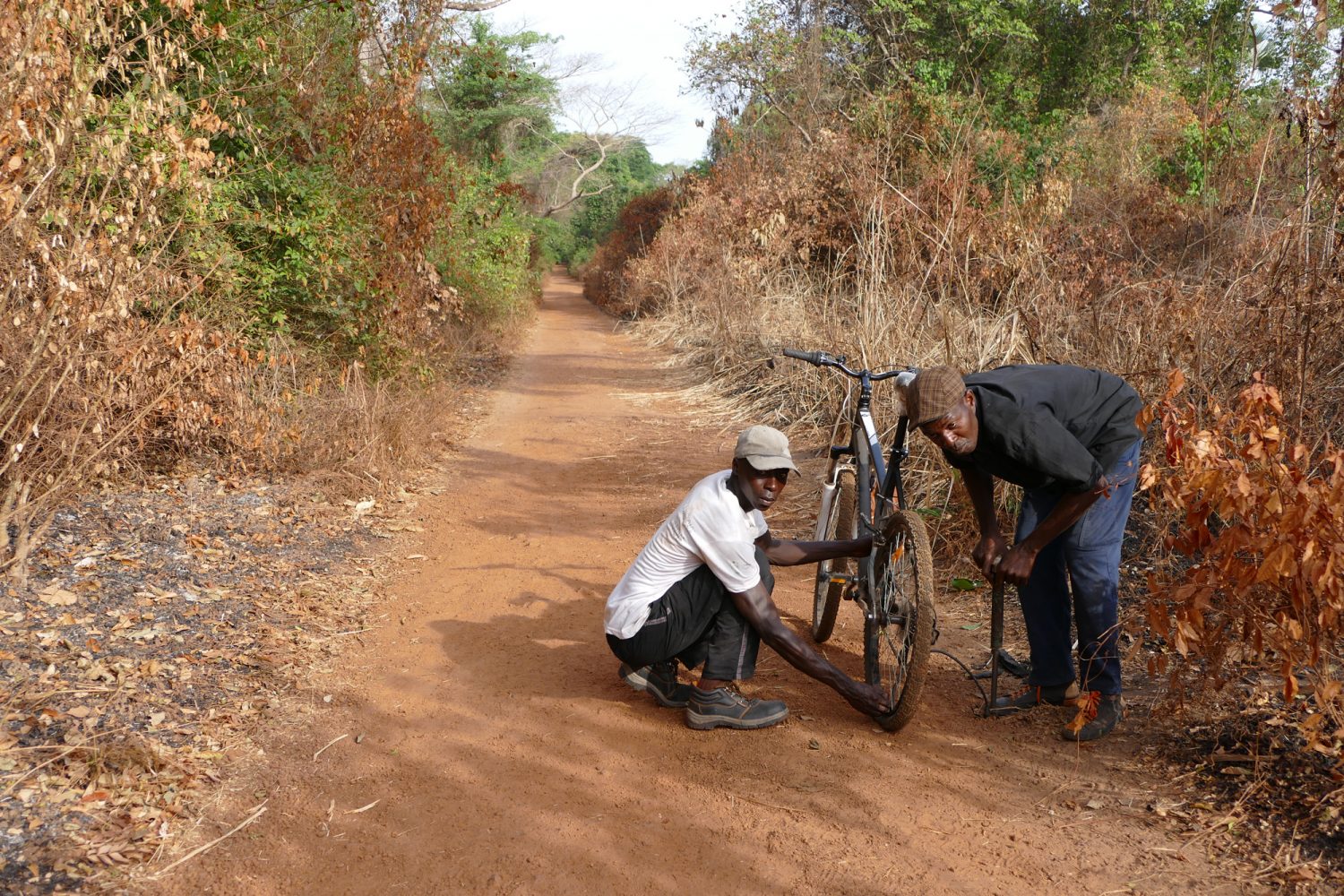

As we patch bike tubes, the chimpanzees cross our path. One of them takes a step back on the path, watching us again. What kind of strange-colored somethings are those? he may think. Usually, not many whites go past this place.
It takes a while to patch the tire. The white liquid is sticky, and the plant with the tiny fibers is said to clog even the smallest hole. “Lasts forever,” says our African guide. In our experience, nothing will last forever in Africa. Eugene gets on his bike, and already after a few meters, the tire is losing air again. But the attempt was not bad. Coming back to the village, we return the bikes to the children we had rented from, realizing that they were likely their bikes
For the six of us, this will be the last evening we can spend together. Each of us would like to eat meat again, so we decide to get chicken. This is not so easy in a village miles from anywhere. A local asks around, and after a few phone calls, he gets three chickens from a neighboring village. We don’t want to eat meat if we don’t know what animal it comes from. It’s rumored that people also eat monkey meat here. We definitely don’t want that or any other bush meat. That’s why it must be chicken. These are delivered alive, the feet tied together, hanging upside down on the moped.
Eugene, who grew up on a farm in South Africa, knows very well how to slaughter chickens. That’s a good thing because in Europe, chickens grow up in plastic bags in the freezer, don’t they?
So the three fellows go into the bush to chop off the chickens’ heads. To slaughter with the hatchet, Didi wants to stretch the chicken’s neck with his hand. Never trust a South African who has a hatchet in his hand, he thinks, and uses a stick instead to help extend his hand. Good thing, because Eugene’s first hit misses his target, splits the chicken’s head instead, and Didi’s fingers would have been exactly there. Cutting the other chicken’s heads off, Eugene holds them more firmly for a cleaner kill.

We start preparing hot water to pour over the chickens. This makes it easier to pluck the feathers. Some ants have already discovered the feathers for themselves and drag them away. At about this time, our chicken delivery man comes back on his moped to ask if he should slaughter the chickens for us. Very nice, but too late.
Yes, there are really three chickens on the grill—little ones. Poulet bicyclette is how they name the thin-legged poultry here. And we first thought two chickens would be sufficient for the six of us. Heather, the good soul, even wanted to release one. But I am starving, and in the end, everyone is grateful that I insisted on three. Anna bakes bread in the Dutch oven that tastes delicious, and we have a pour-the-contents-of-all-cans-I-can-find-in-one-bowl salad.
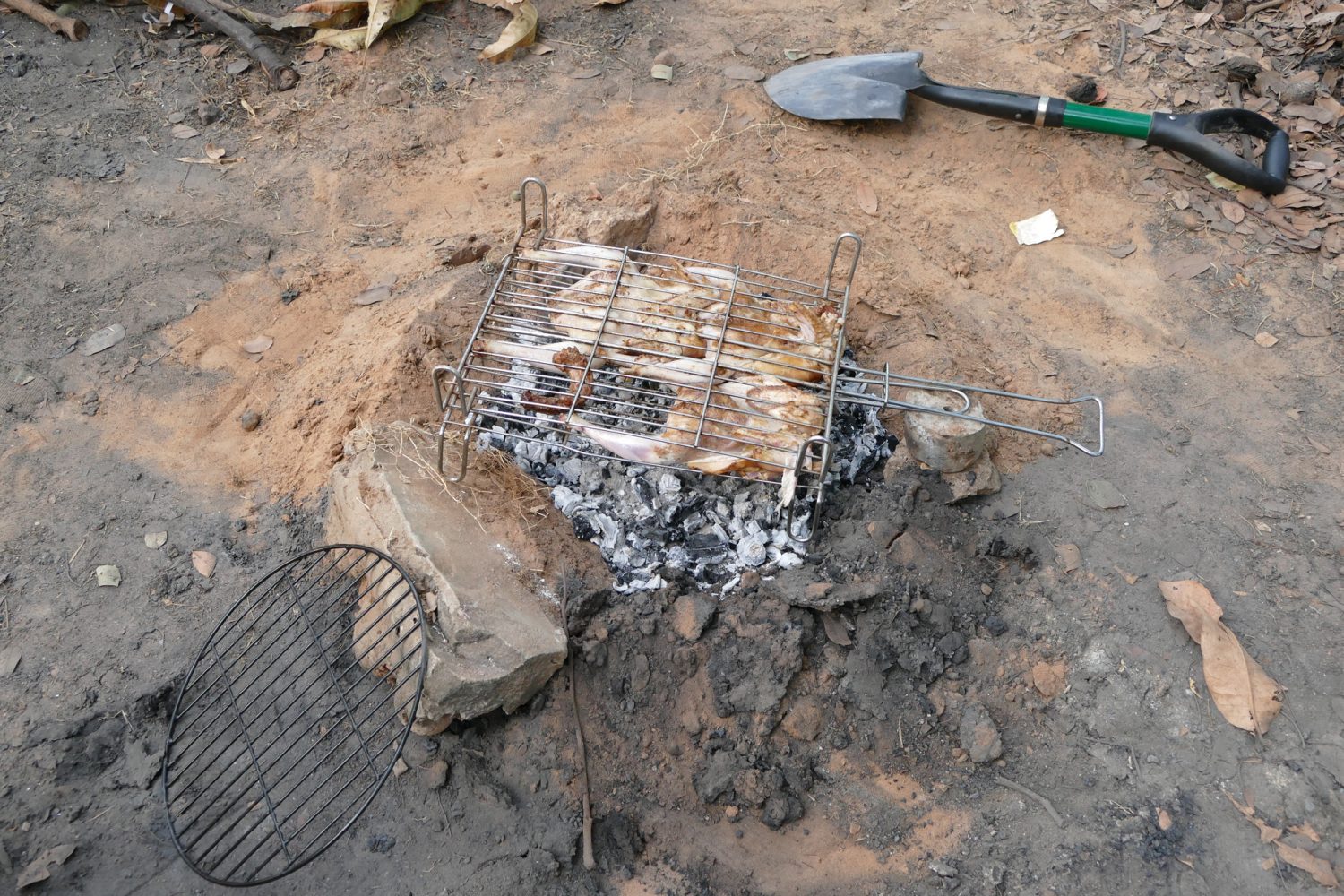
Leaving Guinea Bissau
This is where we part company with the others and drive back to Senegal. Our visa for Guinea Bissau is only valid for four weeks, and the border to Guinea Conakry is closed due to another Ebola outbreak.
We have a new experience when we leave. Coming to the stop sign at the border crossing point, the police officer gets up from his plastic chair, takes it in his hand, quickly tightens the rope across the street at waist level (replacement of the barrier), and slowly walks away from us.
I get out with our papers in my hand and run after him. He sternly looks at me and points to his watch, making clear to me this is now lunch break. His colleagues are already sitting under a pavilion, and two women have brought food in a bowl.
Well, that can take a while, I think to myself, and fear a forced break of several hours here at the border. And it’s almost 40°C in the shade.
So this guy is really serious about it, and when I look at him a little puzzled, he immediately invites us for lunch.
Well, that’s cool! But since we just bought delicious sandwiches (they make the best here in Guinea Bissau), we get them out of the car. We don’t want to take away from their small meal. In retrospect, we learn that our behavior was not very polite. We should have eaten a spoonful and then refused more. To not even taste means not to trust the host.
Everyone is very friendly, and they immediately get two chairs for us. During the break, some moped riders drive around the closed barrier and clatter past the border house. They seem to know each other because the officers don’t pay any attention when they “illegally” cross the border. They finish their lunch break earlier than we thought, and we finish our meal before we go back to the now-open border. Since we are known now, everything is going very smoothly, and we have a lot of fun with the guys.
Having passed customs and immigration, an official stops us again after a few meters. He says he is looking for drugs and will now check our car. He has a quick look through the open window onto the dashboard and says, “Today it is too hot to work. You can go.”
Well, of course, we don’t need to be told twice, so Didi puts his foot on the accelerator. That was our best border experience so far. Hopefully, it will continue like this on our way around Africa.
